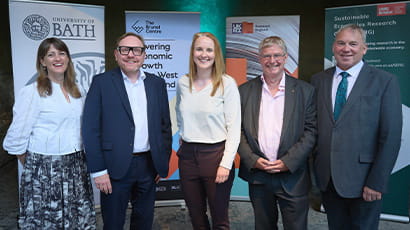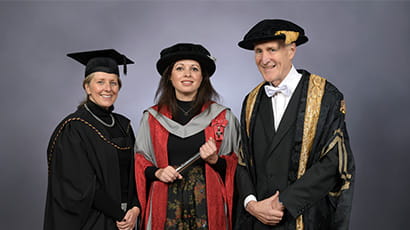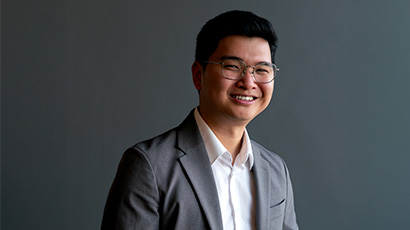Somnus Scientific Chief Executive Dr Tim Craft appointed Visiting Professor

Tim Craft, the Chief Executive of Bath-based Somnus Scientific, has been appointed a Visiting Professor in the Faculty of Environment and Technology, at the University of the West of England (UWE Bristol).
Professor Craft will be working with the Institute of Bio-Sensing Technology based in the Enterprise Zone at UWE Bristol. Uniquely, the Institute integrates a broad range of expertise to perform collaborative research and development to create novel biosensing technology and acts as a catalyst for the exchange of knowledge between academia and industry.
Professor Richard Luxton, Director of the Institute of Bio-Sensing Technology, explains the benefits for UWE Bristol of this new appointment: “Professor Craft is a highly-respected consultant anaesthetist, who also has significant experience in the business world.
"Through his role as Director for Research and Innovation at the Royal United Hospitals, Bath NHS Foundation Trust, Tim has an in-depth understanding of where innovation is needed in healthcare and how to get new technology adopted by the NHS. This knowledge and experience will be invaluable to the university’s students and researchers who strive to contribute to the development of the NHS and to the support of patients. In addition, the university welcomes a strategic relationship with Somnus Scientific, as a regional business, particularly as this will support the progression of UWE Bristol research to impact in the form of new medical products.”
Somnus is developing a suite of products, using a unique biosensor, to measure blood propofol concentration at the point of care. This can be used in Intensive Care Units or in operating theatres to help clinicians accurately assess how unconscious a patient is. This biosensor has been developed in collaboration with researchers from the Institute of Bio-Sensing Technology.
Professor Craft explained: “There is mounting evidence that patients given sedation are frequently over-sedated. As a result, they take longer to get off breathing machines, stay in ICU longer than they need to, and are less likely to survive. Propofol is the most used sedative in the majority of Intensive Care Units, but there is currently no way of measuring how much is in the patients’ blood stream in real-time.
“Despite increasing evidence of benefits to patients and the environment of using Total Intravenous Anaesthesia (TIVA) rather than volatile or gaseous anaesthesia, adoption of TIVA by clinicians is limited partly by the lack of a real-time blood propofol concentration monitor.
“Somnus Scientific Limited is developing a suite of products to fill these gaps and I look forward to continuing my work with the Institute for Bio-Sensing Technology at UWE to progress the research and deliver products that will benefit patients, clinicians and the environment.
“I am delighted to be appointed as a Visiting Professor as this will strengthen the partnership between Somnus and the University and help to ensure rapid progress of the Somnus products to market thus supporting patients who are given propofol. The appointment will give me an opportunity to utilise my clinical expertise as a consultant anaesthetist, as well as my business experience to educate students and researchers; hopefully inspiring the next generation of health professionals and medical technologists!”
Related news

25 November 2025
Health-tech start up MyCelsius launches breakthrough cooling tech for hot flushes developed at UWE Bristol’s Launch Space
A pioneering Bristol-based health-tech company developing cutting-edge cooling technology for hot flushes has credited UWE Bristol’s Launch Space incubator with playing a key role in accelerating its product development.

22 August 2025
A decade of Future Space: How UWE Bristol’s enterprise zone is powering innovation and economic growth
Tracey John, Director of Research and External Engagement, reflects on the impact of Future Space and its role as a launchpad for cutting-edge companies shaping the future of how we live and work.

20 August 2025
Nigerian higher education leaders explore new routes to university-industry collaboration at UWE Bristol-led event supported through HEIF
An event brought together through UWE Bristol’s Centre for African Social and Economic Transformation (CASET) discussed innovative approaches to improving graduate employability in Nigeria.

11 July 2025
Wound dressings developed with support from UWE Bristol to be launched by global firm
Technology that a team of UWE Bristol scientists helped develop to aid the healing of chronic wounds will be used in new ‘smart dressings’ being launched by global medical company.

10 July 2025
Researcher awarded funding to develop digital health platform that connects people to local services
A UWE Bristol academic has received funding to develop an online platform that connects people to local community organisations offering health and social care support.

03 July 2025
Research lab The Brunel Centre opens to power sustainable and inclusive growth for the West of England
A new data and research centre designed to support sustainable and inclusive growth and industrial strategy in the region, has officially launched.

11 June 2025
Telling our story at UWE Bristol: RISE with us
UWE Bristol has launched RISE - standing for Research, Innovation, Skills and Enterprise - an institutional framework which shapes the University's purpose, culture and future growth.

23 May 2025
New Centre launched at UWE Bristol to drive social and economic change across Africa through HE partnerships
UWE Bristol has launched the Centre for African Social and Economic Transformation (CASET) — a collaborative platform to support African-led innovation, research and HE initiatives.

11 December 2024
UWE Bristol alum develops flatpack wood stove to heat homes damaged in conflict
A UWE Bristol alum has designed a flatpack wood burning stove which will provide a vital heat source for people whose homes have been damaged in areas of conflict across the world.

28 November 2024
Entrepreneur and advocate for workplace equality awarded honorary degree by UWE Bristol
Dr Zara Nanu MBE, an innovator in addressing workplace inequalities and tackling the gender pay gap, has been awarded an honorary degree by UWE Bristol.

21 November 2024
Crypto-trader training platform among eight graduate businesses to receive funding boost
A platform that trains people to trade cryptocurrency safely is one of eight graduate businesses to have received funding through UWE Bristol’s Entrepreneurial Futures Award.

20 November 2024
Innovative university-business partnership to power economic growth and devolution for the West of England
A new centre created by the University of Bath with UWE Bristol and Futures West will pioneer new approaches to economic research and data analysis for the West of England.






